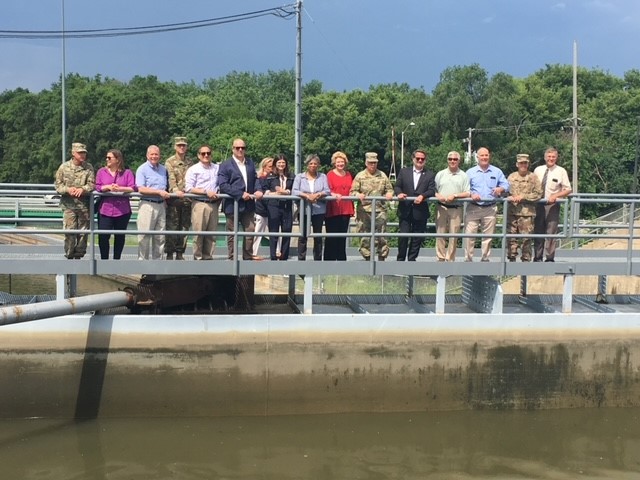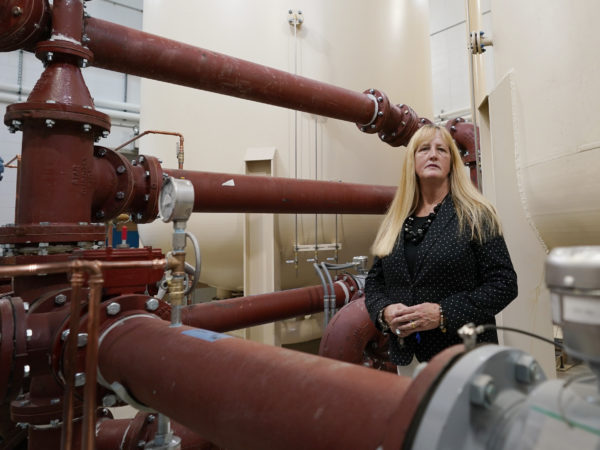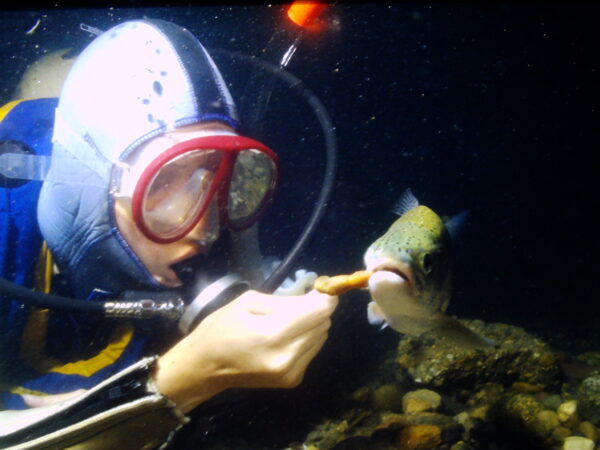
The trek in the Great Lakes region’s efforts to stop the advance of invasive carp could be classified as a long, strange and seemingly never-ending trip.
It started in the early 2000’s when advocates were successful in securing electric barriers to repel the fish. That was an interim measure and was followed by an over-the-top $18 billion plan to separate two great watersheds. The region finally landed on a smaller scale plan to construct a choke point in the Chicago Area Waterways System, the gateway to the Great Lakes for the carp. That plan is in the design stage now by the Army Corps of Engineers with an estimated completion date of 2030.
Policy advocate Molly Flanagan has been along for much of this ride.
Flanagan is the chief operating officer for the Chicago-based non-profit, the Alliance for the Great Lakes, and has specialized on policy issues with an emphasis on the invasive carp threat.
Great Lakes Now recently spoke with Flanagan about the Brandon Road project, as the carp plan is called. She addressed its status and that it’s at risk as the Army Corps and the state of Illinois are at odds over a required agreement that is necessary for the project to advance, as Great Lakes Now reported in June 2023.
Great Lakes Now also asked Flanagan about another big Great Lakes issue, diversion of water threats to needy areas outside the Great Lakes basin. She disclosed that the biggest threat may actually be closer to home.
Contributor Gary Wilson conducted the phone interview and it was recorded, transcribed and edited for length and clarity.
Molly Flanagan: Illinois and the Army Corps have been working on the partnership agreement for at least a year. Every time I think they’re making progress, things seem to grind to a halt. That’s discouraging, but they continue the negotiations and we continue to pressure Illinois to do the right thing and sign the agreement.
GLN: What are the barriers?
MF: The primary delay is Illinois not signing the agreement due to the potential for hazardous material on lands that are owned by Midwest Generation. Illinois needs some of the land owned by Midwest Generation near Brandon Road lock and dam in order to stage construction of the project. However, staff from the Michigan DNR, the Illinois DNR and the Army Corps have done an analysis that shows the risk of contamination is actually quite low.
GLN: Has there been any movement towards an agreement or is it a stalemate that might not be resolved?
MF: I don’t want to say it won’t be resolved, it has to be resolved. Every time I think they’re making progress, it feels like things backslide and the agreement doesn’t get done. Illinois is running out of excuses and right now it is single handedly delaying the project.
GLN: Going back to when Illinois Gov. Bruce Rauner was in office, it was clear that the invasive carp issue was not a priority. Gov. J.B. Pritzker took office in 2019 and endorsed the project but hasn’t had a high profile on it. Who in Illinois is responsible?
MF: I’m not sure where the holdup exists in the Illinois government. If at the Illinois DNR or within the governor’s office. Regardless, Gov. Pritzker is ultimately responsible for this project getting done and we’re trying to get more attention from the governor’s office in hopes that will help move things along. I want to be clear and direct about it — Illinois will be responsible if invasive carp make it into the Great Lakes.
GLN: If there’s no agreement in a reasonable time period, is the federal funding at risk?
MF: The reasonable time period has passed. I’m not sure about the federal funding being at risk. There is $274 million federal dollars available for the Brandon Road project and that’s enough to pay for the engineering phase and the first year of construction. Michigan and Illinois have appropriated all the funds needed for construction so all of the required state funds are in hand as are the federal funds for the first year. But none of that can do anything until Illinois signs the agreement.
GLN: The original plan to stop the carp advance was released in 2014, came with an $18 billion price tag and would have taken a decade or more to physically separate the Mississippi River and Great Lakes watersheds. That plan was dead on arrival and the smaller scale Brandon Road project emerged in approximately 2016.
Since, aggressive fishing has successfully kept the invasive carp at bay. Is it time to question the actual need for the Brandon Road plan? Which was originally estimated to cost $225 million and the number is now $1.1 billion and with inflation could go higher.
MF: Last fall Illinois did a harvest for invasive carp and pulled one million pounds of fish in one day. That’s more than they harvested in all of 2022. That shows the population is increasing and with that, there’s a higher probability that the fish will need to move in order to find food and habitat. The project remains critical and if anything the need for it is increasing.
GLN: The eight Great Lakes states have a reputation for collaboration on big issues like the Great Lakes Compact. But on invasive carp, only Michigan and Illinois have contributed funding. Wisconsin and Ohio are conspicuous by their absence considering their geography, especially Ohio given the risk to Lake Erie’s world-class fishery. Does this send a message on the need for the Brandon Road project? That it’s less of a priority for the outlying states?
MF: All of the Great Lakes states are supportive of the Brandon Road project including Ohio Gov. Mike DeWine. I don’t think the lack of funding shows a lack of support for the project.
In Michigan there is an ethos around the Great Lakes that is different than in the other states and Michigan is likely to see the worst impact given its place as the Great Lakes state. So I understand why Michigan is contributing funds to the project. We would like to see all the states contribute but that hasn’t come to fruition.

Michigan congressional delegation at Brandon Road. (Photo Credit: Gary Wilson)
Diversion threats
GLN: The Great Lakes Compact designed to prevent large-scale diversions to water-needy areas recently marked its 15th anniversary. There was a celebratory event in Ann Arbor that you participated in and the consensus was that the compact has sent a message that the Great Lakes are off limits for large scale diversions.
But since 2008, the water landscape in the U.S. has changed. The Colorado River is in crisis, groundwater is being depleted faster than it can be replenished, climate change threats to water are here now and there’s a move to commodify water.
Michigan’s James Clift represents Gov. Gretchen Whitmer on compact issues and he recently told Great Lakes Now that the state sees the compact as a settled document. He said it has done its job. And this class of governors have shown little interest in the diversion issue. What’s your take? Is the compact up to the task of deterring future threats? Be they 5, 15 or 25 years from now?
MF: It’s unlikely that we’re going to see a real threat of diversion from two states in the southwest or other parts of the country. That’s because water reuse and desalination are going to be a lot cheaper for those areas of the country than trying to get Great Lakes water to them.
The biggest threat is from the Great Lakes states that are party to the compact.
That’s because we’ve seen water intensive chip plants that are planned in Ohio and Indiana in areas that don’t have enough water and aren’t in the Great Lakes basin. You could see a future where states might want to divert water outside of the compact exception area to fuel economic growth. That’s something we need to pay attention to as a region. If that pressure started to mount that would be problematic.
GLN: Water that Chicago diverts from Lake Michigan is outside of the scope of the compact and last year it announced a 100-year, billion dollar deal to sell water to Joliet which is well outside the Great Lakes basin. Chicago indicated that it’s open to future revenue-generating water deals. This caused Cleveland Plain Dealer editors to say Chicago’s move should be a “stark warning” for the compact. Should governors be calling on Chicago and Illinois to abide by the spirit if not the letter of the compact?
MF: Illinois has a responsibility to use any water that it takes from the Great Lakes responsibly. There’s a need for greater conservation and looking at other options like water reuse.
GLN: In 2021 prompted by the creation of water futures markets, greater Chicago’s water commissioners passed a resolution cautioning against the commodification of water, declaring it a human right and said it should remain in the public trust. Should the broad Great Lakes community of advocates, commissions and other interested parties be taking a similar public position?
MF: I agree that water is a human right and all of us working on Great Lakes issues are responsible for making sure that everyone in the region has access to safe and affordable drinking water and adequate sanitation. All of our organizations should be pushing for that at all levels of government.
GLN: What about the commodification aspect of water? That’s what the commissioners were trying to put a spotlight on? That Great Lakes water should be a public trust and not a commodity to be bought and sold.
MF: As the resolution says, Great Lakes water is already held in the public trust, and that’s something we should protect and be proud of. Our region does not allocate and trade water rights the way some western states do, and there is no future in selling Great Lakes water rights. That decision was made in the Compact.
GLN: The Alliance for the Great Lakes has a long history of engaging with citizens at the grassroots level. How do especially young people see current and past efforts to restore and protect the Great Lakes?
MF: What I’ve seen from younger people is that they’re not willing to be satisfied with what their predecessors have done.
We’ve made great progress on the Great Lakes and I don’t want to diminish that progress. But, there’s more work to do and they’re right to point out those issues and hold us accountable to do better.
We’ve seen a lot of energy from young people and a lot of hope, which is helpful because in this work, it’s easy to say we’re not making progress. Engaging with young people shows us that there’s positive energy and a next generation of people who care about the Great Lakes who will carry this torch forward.
If I were in their shoes I’d be disappointed because some of these issues like agriculture pollution have plagued the Great Lakes for decades and we should have made more progress. If I were younger I’d probably feel impatient and that’s good, because that means maybe the next generation will be able to solve some of the problems that we haven’t.
Editor’s note: The Illinois Department of Natural Resources declined an interview request on the Brandon Road Invasive Carp project.
Catch more news at Great Lakes Now:
New EPA Great Lakes executive warns on “moon shot” cleanup goal for toxic sites
Featured image: Molly Flanagan speaking in Ann Arbor in December 2023. (Photo courtesy of Great Lakes St. Lawrence Governors & Premiers via Molly Flanagan)
1 Comment
-
Thanks Mr. Wilson for an informative article. I am from NY and just now learning that our Great Lakes waters need more and more protection. A lot of water, requires a lot of care.
HRothfuss




